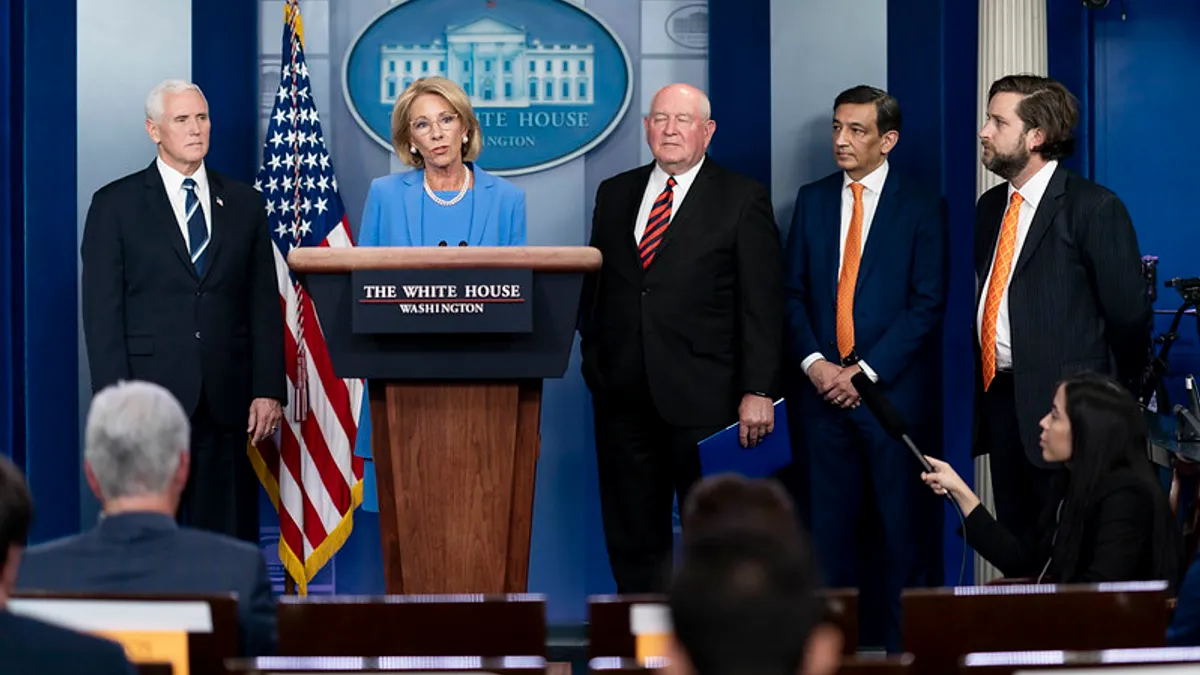As part of the Coronavirus Aid, Relief, and Economic Security Act, U.S. Secretary of Education Betsy DeVos this week submitted to Congress waiver requests that, among other changes, include flexibilities for transition timelines under the Individuals with Disabilities Education Act.
But the flexibilities called for by the U.S. Department of Education don’t completely align with what education leaders had conveyed were necessary.
If granted, these waivers would allow districts to postpone initial evaluations for toddlers with disabilities as they transition into K-12. Obligations to conduct initial evaluations and determine timelines would resume when health and safety factors allow for in-person meetings — as opposed to existing law, which requires a transition plan in place 90 days before a toddler’s third birthday.
In the meantime, districts would still be required to continue educating and providing early intervention services for toddlers who have turned 3 years old, regardless of their eligibility determination.
Flexibility needed as leaders work "around the clock"
While these waivers are a start, the Council of Administrators of Special Education said, they don’t meet all the needs administrators had vocalized.
For instance, Danny Carlson, director of advocacy and policy for the National Association of Elementary School Principals, said, “We've called for striking a balance to reaffirm that principals and school leaders are doing everything they can, but also recognizing that some very narrowly targeted, temporary flexibilities while schools are closed are needed.”
He added that school leaders are “working around the clock” to continue educating remotely.
At the time of the act's passage, educators requested flexibilities around IEP review and complaint timelines, reevaluation requirements, and procedural and fiscal maintenance requirements. This waiver request leaves those areas untouched.
In the meantime, districts must find ways to continue services and meet deadlines or collaborate with parents to find solutions on a case-by-case basis. Previous guidance by the department suggests encouraging district leaders to continue as many special ed services as possible and find flexible alternatives to in-person services.
And this time, DeVos says the department “has provided extensive flexibility to help schools transition,” adding that Congress need not waive other provisions.
Continuing a "good faith effort" to find solutions
But some say continuing to educate all students with no other flexibilities in the law is easier said than done. Meeting IEP timelines while simultaneously transitioning to an online learning environment, which isn’t conducive to special ed requirements like therapy or progress monitoring, has left many districts scrambling to find solutions.
According to Education Department guidance — and, in turn, state-level guidance in many places — districts are being urged to work with families and agree on timeline extensions. States including Kentucky are looking for a “good faith effort” from districts.
Communication with families, keeping documentation of all efforts, and working with community partners is working for some schools. But in other locations, parents had begun litigation just a few weeks into closures, AASA advocacy director Sasha Pudelski said. The disconnect between parents and districts was especially exacerbated where communication was lacking.
In a move criticized by many, New Jersey districts required parents to sign waivers prior to continuing special ed services, fearing legal retaliation where they fell short.
What’s next
For now, Meghan Whittaker, director for policy and advocacy at the National Center for Learning Disabilities, suggests while IEP meetings can be conducted virtually, re-evaluations may have to be postponed for a later date when in-person meetings are possible. In some cases where existing information like performance data informs reevaluations rather than new assessments, even those re-evaluations may still be possible.
And there still remains the hope from administrators that Congress could include additional flexibilities outside of what DeVos requested in its next package.
“I think most folks understand that this isn’t a request for something that’s ‘nice to have.’ This is a real challenge. There’s not a panacea,” Carlson said. “But we’re hoping that leaders in Congress help schools get through the remaining months of the school year with some sort of clarity and certainty.”








 Dive Awards
Dive Awards












